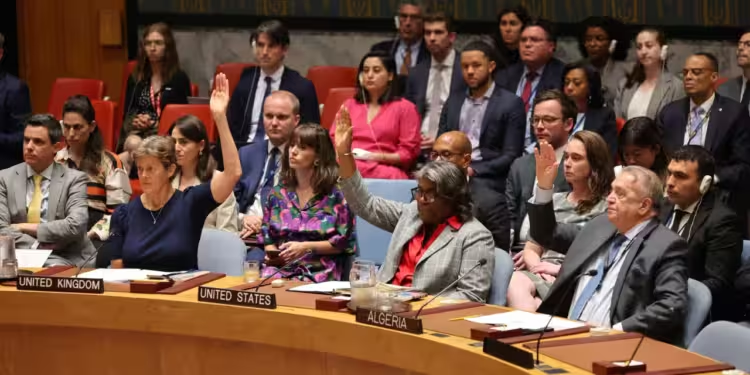The United Nations Security Council endorsed a proposal by US. President Joe Biden for a ceasefire between Israel and Hamas in the Gaza Strip, urging Palestinian militants to accept the deal aimed at ending the eight-month-long war. Hamas welcomed the US drafted resolution and expressed readiness to cooperate with mediators to implement the principles of the plan, as long as they align with the demands of the Palestinian people and their resistance efforts.
Russia abstained from the UN vote, while the other 14 Security Council members supported the resolution endorsing Biden’s three-phase ceasefire plan, initially proposed on May 31 as an Israeli initiative. “Today we voted for peace,” US Ambassador to the UN Linda Thomas-Greenfield declared to the council after the vote. The resolution, which calls for an immediate cessation of hostilities, states that Israel has accepted the ceasefire proposal and calls on Hamas to do the same. It urges both parties to implement the terms of the ceasefire without delay or conditions.
Algeria, the only Arab member of the Security Council, backed the resolution, citing it as a potential step towards an immediate and lasting ceasefire. Algeria’s UN Ambassador Amar Bendjama emphasized that the resolution offers hope to the Palestinians, urging an end to the violence. The resolution details the ceasefire proposal and specifies that even if negotiations for phase one exceed six weeks, the ceasefire will continue as long as talks persist.
However, the resolution lacked sufficient detail for Russia. Russia’s UN Ambassador Vassily Nebenzia questioned what Israel had specifically agreed to and expressed concern over the Security Council endorsing agreements with “vague parameters.” Despite these reservations, Nebenzia stated that Russia did not block the resolution due to its support from the Arab world.
Israel’s UN Ambassador Gilad Erdan attended the vote but did not address the council. Instead, senior Israeli UN diplomat Reut Shapir Ben Naftaly reiterated Israel’s objectives in Gaza: to free all hostages, dismantle Hamas’ military and governing capabilities, and ensure that Gaza no longer poses a threat to Israel. She emphasized that Hamas alone is responsible for prolonging the conflict.
The Security Council had previously called for an immediate ceasefire and the unconditional release of all hostages held by Hamas in March. For months, negotiators from the US, Egypt, and Qatar have been striving to mediate a ceasefire. Hamas has expressed a desire for a permanent end to the war in the Gaza Strip and an Israeli withdrawal from the enclave, home to 2.3 million people.
The conflict escalated on October 7, when Hamas militants launched an attack on Israel, killing over 1,200 people and taking more than 250 hostages, according to Israeli reports. Israel’s subsequent air, ground, and sea assault on Gaza has resulted in the deaths of over 37,000 Palestinians, according to health authorities in Gaza.
The UN resolution represents a significant international effort to halt the ongoing violence and address the humanitarian crisis in Gaza. The proposal includes a three-phase plan aimed at achieving a sustainable ceasefire, securing the release of hostages, and rebuilding Gaza.
Phase one focuses on an immediate cessation of hostilities and the establishment of a humanitarian corridor to provide aid to the affected population. Phase two involves negotiations for the release of all hostages and the withdrawal of Israeli forces from Gaza. Phase three aims at long-term peacebuilding and reconstruction efforts, including international support for Gaza’s rebuilding process and mechanisms to prevent future conflicts.
The USand its allies have emphasized the importance of a comprehensive and sustainable ceasefire that addresses both immediate humanitarian needs and long-term political solutions. The involvement of Egypt and Qatar as mediators underscores the regional significance of the conflict and the need for a collaborative approach to achieve lasting peace.
As part of the diplomatic efforts, US Secretary of State Antony Blinken is set to visit Egypt and Israel to further push for the ceasefire agreement and facilitate discussions between the conflicting parties. Blinken’s visit aims to reinforce the U.S. commitment to peace in the region and to support the implementation of Biden’s ceasefire proposal. The endorsement of the resolution by the UN Security Council marks a critical step towards de-escalating the conflict and addressing the extensive humanitarian suffering in Gaza. The international community remains hopeful that both Israel and Hamas will adhere to the terms of the ceasefire and work towards a peaceful resolution.
The ongoing negotiations and diplomatic efforts reflect a concerted attempt to bring an end to the violence and to lay the groundwork for future stability in the region. The resolution’s approval signifies a collective call for peace and a commitment to supporting the people of Gaza in their quest for security and rebuilding their lives.
As the world watches closely, the implementation of the ceasefire and the cooperation of all involved parties will be crucial in determining the future of Gaza and the broader Middle East region.
















